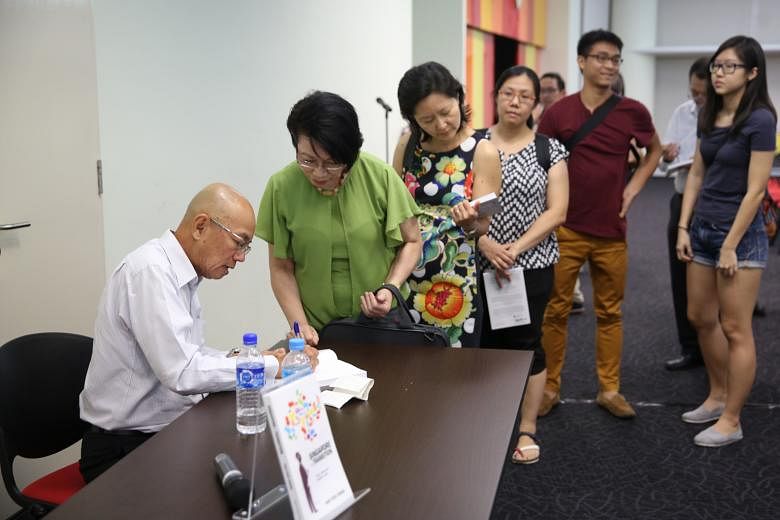The Sunday Times columnist Han Fook Kwang set a new record for The Big Read Meet on Wednesday, when 170 readers turned up at the National Library Board (NLB) headquarters in Bugis to discuss his new book, Singapore In Transition: Hope, Anxiety And Question Marks, which comprises 40 of his favourite columns.
The three-year-old meet, a non-fiction book club which I moderate monthly, usually draws between 40 and 70 readers a session and between 80 and 160 every time an author speaks.
Mr Han, who was editor of The Straits Times from 2002 to 2012, spoke to a rapt audience for 90 minutes before signing more than 50 copies of his book for them.
Their strong interest in what he had to say was fitting, as the 63-year-old told them that it was a flood of encouraging feedback from readers like them that had him returning to column-writing regularly from late 2012, after a 10-year hiatus. "The worst thing for a writer is when he does not get any feedback," said Mr Han, who wrote his first newspaper column in 1989. Happily, he has never lacked feedback.
In fact, in his previous nine-year career as a civil servant in the then Ministry of Communications, he got no end of feedback from readers about the regular hikes in road tax at the time and the hefty additional registration fee for cars here, to tamp down on traffic congestion.
"There were angry letters to the ST Forum page, like 'Can't you understand we need a car in Singapore?'" recalled Mr Han, who was involved in drafting the very transport policies that made people so irate, and whose duties included responding to such letters on behalf of his boss, the ministry's Permanent Secretary Sim Kee Boon.
When they took to writing in to ST every single day, he decided that "I can't be replying to every letter".
So, he called the Forum editor and told the latter that every Friday, he would write a letter in response to every reader's complaint about his ministry.
"I became an unpaid writer of ST," he quipped to laughter, adding that "the moral of the story" was that unpaid writers might just become editors of ST one day.
There was a steady flutter of raised hands to quiz him on issues such as the Government's continued refusal to give the money acquired from maid levies to the maids themselves; how ST could attract youth weaned on social media and what the difference was between public servants in his time and those today.
Many among the participants read passages from Singapore In Transition back to him before asking questions, including page 199, in which he wrote of challenging the students of Raffles Institution (RI) to clean their entire school - toilets and all - themselves.
Mr Han, an old boy of RI who is on its board, said he asked two assemblies of RI students: "Do you want to make history in Singapore? Be the first school in Singapore to clean up after yourselves. That will be news."
The whole point, he stressed, was not about keeping a place clean, but that cleaning a place that everyone shared would build a sense of community, one in which everyone looked out for everyone else.
So, he was glad when the Ministry of Education announced recently that it would soon introduce a cleaning programme in schools here. It remained to be seen, however, if students here could do so without an army of cleaners and without regarding cleaning as a low-paying job, he added.
As to how civil servants today differed from those of yesteryear, Mr Han mused: "I remember that, as a young civil servant then, we could propose any solution. I felt at that time that we could solve any problem. Of course, we had to justify and defend our solution. But we were encouraged to be open- minded to problem-solving."
He added that he learnt first-hand from his mentor, Mr Sim, then head of the civil service, what being hands-on meant.
On their stopover in a Gulf state en route to Paris for work, he watched as Mr Sim inspected the Gulf airport's toilet. "He looked into every cubicle to see how clean the toilets of Changi Airport's competitors were."
Author, poet and playwright Robert Yeo, 76, who was among the audience, said the evening was a "very stimulating session".
He said: "I had not read him carefully in the past and will now do so."
Ms Lee Shi Min, 23, who had asked Mr Han whether he thought the Government should grant the public greater access to granular official data, such as on the skills level of migrants, said afterwards: "I thought his reply rather reasonable. He put out ideas about improving the situation and how all kinds of people could work together and show the Government how more enlightened things could be."
• Singapore In Transition: Hope, Anxiety And Question Marks by Han Fook Kwang is published by Straits Times Press and is available at $25 a copy with GST at all leading bookstores.
• Celebrate the third anniversary of The Big Read Meet on July 27 from 6.30pm at National Library Board headquarters, 100 Victoria Street, The Possibility Room, Level 5. The highlight will be a talk by geopolitical strategist Parag Khanna on his new book, Connectography. Sign up for it at any NLB e-Kiosk.


